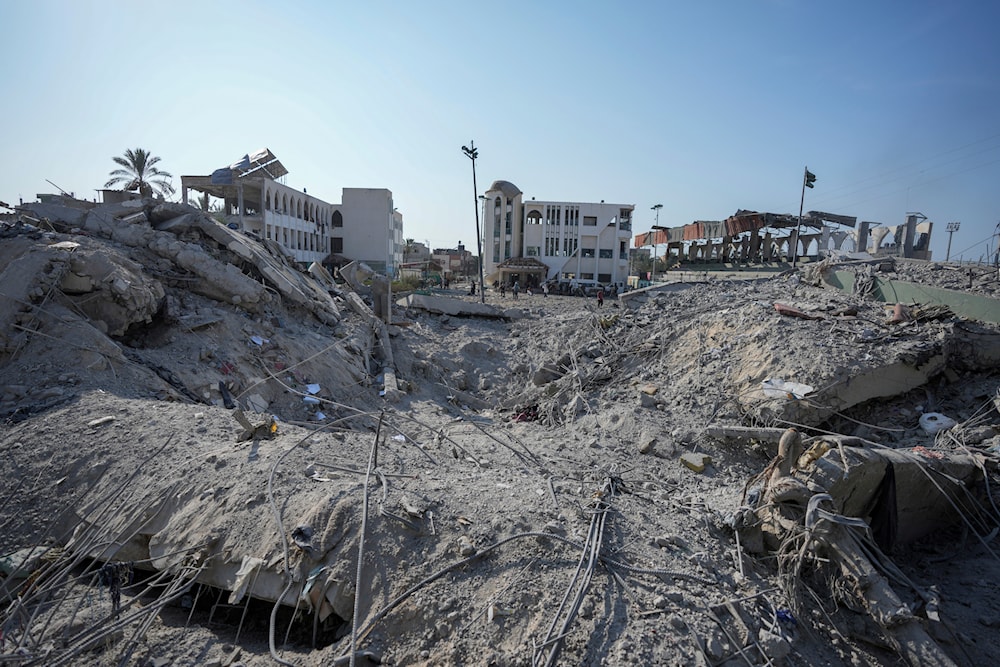Cairo talks on Gaza ceasefire reach deadlock: Reports
The Gaza ceasefire and prisoner exchange talks being held in Cairo have come to a dead end.
-

Palestinians inspect the rubble of a school destroyed in an Israeli airstrike on Deir al-Balah, central Gaza Strip, occupied Palestine, Saturday, July 27, 2024 (AP)
Negotiations held in Cairo on Saturday regarding a ceasefire in the Gaza Strip and a potential hostage exchange have reached a deadlock, according to Axios political reporter Barak Ravid. Despite the high-level discussions, no breakthrough was achieved.
A high-level Israeli delegation had arrived in Cairo to engage with Egyptian special services on the matter. However, two Israeli officials reported that the talks did not produce the desired results, with negotiations remaining stalled and a resolution seemingly distant.
The stalemate follows reports from the Spanish news agency EFE on Friday, which cited Egyptian security services indicating that contacts between Egyptian and Qatari intermediaries with the Israelis had "stopped completely." This cessation followed the assassination of Hamas political leader Ismail Haniyeh.
Israeli Prime Minister Benjamin Netanyahu had previously authorized negotiators to travel to Cairo for these talks, as reported by The Times of Israel. The negotiations aimed at reaching a ceasefire and facilitating a hostage exchange deal with the Palestinian movement Hamas.
The situation further escalated earlier this week when Hamas confirmed that Ismail Haniyeh was killed in an Israeli attack on his residence in Tehran. This attack occurred after Haniyeh participated in the inauguration of newly elected Iranian President Masoud Pezeshkian.
In the aftermath of the assassination, Iran's UN envoy Saeed Iravani said that Haniyeh's death "would not have happened without an American green light and intelligence support to carry out the operation."
Yet according to National Security reporter at The Washington Times Dan Boylan, Washington was unaware of "Israel's" plans to kill Haniyeh. He further claimed that US Secretary of State Anthony Blinken and the Pentagon were kept in the dark about the operation.
Netanyahu not interested in US proposal
Biden put forward a ceasefire proposal in May that included a three-phase execution plan. The US National Security Advisor stated then that Biden's proposal was in fact an Israeli one.
However, after Hamas said it "views positively" the terms of the agreement, Netanyahu announced opposition to "Israel's" own deal, saying that the war on Gaza would not end until "all objectives are achieved" and rejecting to make any kind of commitment that the aggression would stop, neither orally nor written.
"[Israeli Prime Minister Benjamin] Netanyahu wants a deal that is impossible to get. At the moment, he isn't willing to move and therefore we might be headed for a crisis in the negotiations rather than a deal," an Israeli official pointed out.
Moreover, it was reported that the Israeli occupation presented Saturday an updated plan to the United States regarding the Gaza captives and ceasefire negotiations.
The negotiations surrounding the ceasefire agreement are at a pivotal stage, Axios columnist Barak Ravid underlined as he cited US President Joe Biden stressing the importance of retaking the captives and reaching a ceasefire agreement two day prior.
Israeli occupation Prime Minister Benjamin Netanyahu has been in pursuit of an agreement, too, though a different kind of agreement; one that would allow the Israeli occupation to carry on with its onslaught on Gaza while further stifling the Palestinians in Gaza by allowing "Israel to control the Gaza-Egypt border.
The proposal also outlines changes in the redeployment locations for Israeli occupation forces in Gaza during the initial phase of the deal, with IOF soldiers remaining in the Philadelphi corridor along the Gaza-Egypt border during this phase.

 4 Min Read
4 Min Read








